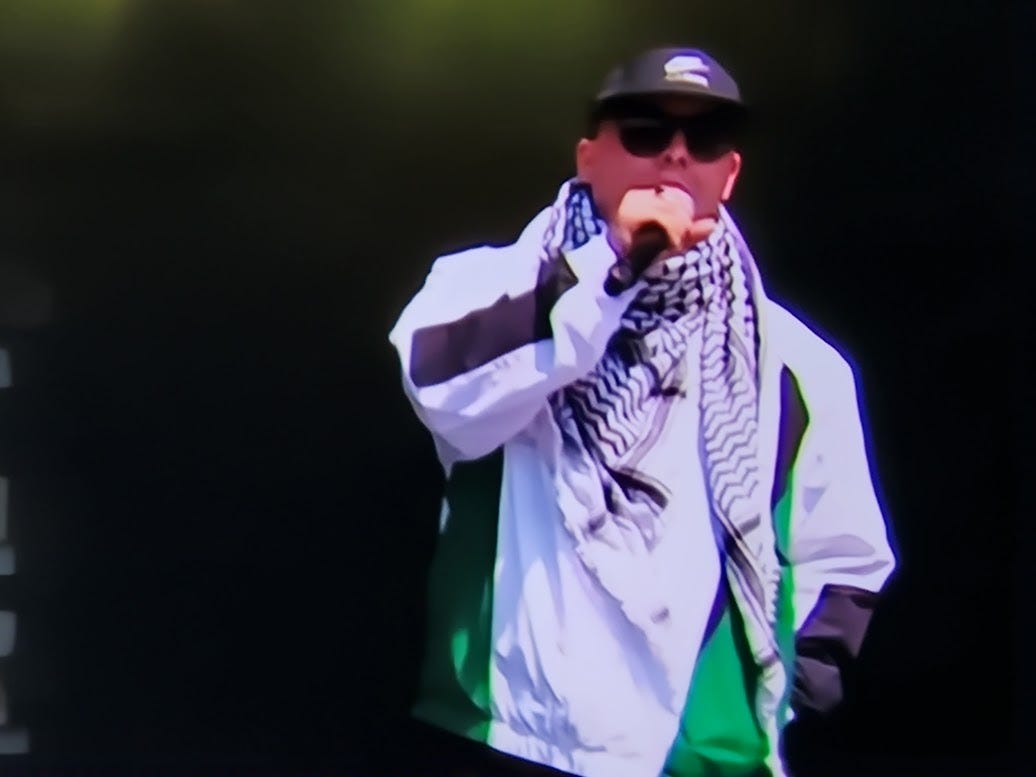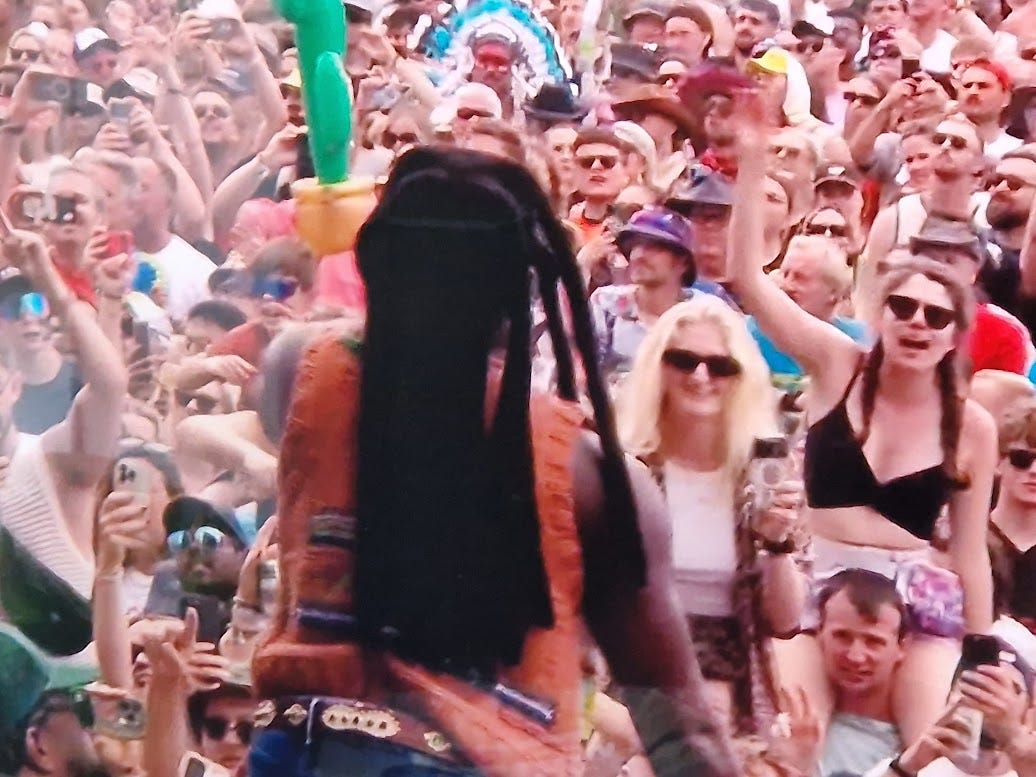NOTES FROM THE SOFA: GLASTONBURY
WHAT I WATCHED WHILE SPRAWLED ON THE SOFA AS A HEATWAVE TOOK HOLD
Oh no! Its Kneecap! The Belfast rappers’ appearance at Glastonbury was condemned by Kier Starmer and every other idiot out there.
Glastonbury has finished and Wimbledon started - for the English middle/upper classes this is their favourite time of year, famous pop singers and tennis players doing their best to engage and entertain viewers and, for those who don’t have tickets to attend these hallowed sanctuaries, then the big events are screened free on the BBC.
I’ve never attended either event but, having been raised by tennis loving parents, I did grow up watching Wimbledon (in Aotearoa it occurs mid-winter – did they delay transmission so we watched the matches the following day? I don’t recall) and heard of Glastonbury via reading NME and Sounds, two weekly British music papers.
Although in the late-1970s, early 1980s when my early teen self was devouring said papers they didn’t devote much coverage to the festival – promoting post-punk bands who were regularly rolled out as “the future of music” (but weren’t festival fare back then) – saw Glastonbury dismissed as old hat. Back then Glastonbury was considered largely a “hippie festival” (its roots were in the free festival scene of the late 1960s) and lineups may have reflected this. Funny how the music press is now extinct yet music festivals go from strength-to-strength - I’m on the wrong side of history!
Arriving in the UK in early 1991 I soon realised summer music festivals were an event – festivals had collapsed in NZ due to disinterest, while I’d never heard of any when living in the US - and Glastonbury was the big daddy of them all, being both the largest in terms of capacity and most eclectic of booking policies ie most of the other big festivals stuck to a musical genre (Reading – indie, Donnington – metal, Cambridge – folk, Womad - world etc), while Glastonbury featured all of these (except metal – Midlands proles’ not welcome? Something like that) .
Having gone to Sweetwaters (the biggest Kiwi 3-day summer music festival) twice as a teen, and found watching the likes of Roxy Music and Split Enz in a dusty field surrounded by tens of thousands of people unenlightening, I’d since shied off festivals so gave no thought to attending In early 90s London a flatmate went to Glastonbury and, on returning, told me he felt lonely being there by himself. That said, a carload of friends drove down and jumped the fence to get in – this was, for many people, part of the appeal of Glastonbury (the thrill of getting in for free) – and they had a great time. Partying with pals being then (and likely now) a big part of Glastonbury’s appeal.
I started writing for The Guardian in 1996 and they sent me to review Reading Festival three years in a row. It was awful, completely lacking the imagination and eclecticism that apparently makes Glastonbury so enjoyable. At Reading you stood in a muddy field watching the Stone Roses and Black Grape, Metallica and Marilyn Manson, doing their schtick while students got drunk and, once the sun set, built pyramids of plastic pint glasses then set them alight. Not my idea of a good time. The best thing about Reading was its proximity to London – as The Guardian were picking up my expenses I’d train it there-and-back daily, arriving for the evening’s headliners then fleeing, as the headline act wound up, back to my south London bed.
My musical enthusiasms meant I went to Womad several years in a row and camped - the English weather then being variable meant this could prove challenging - the music from across the globe made braving rain/mud worthwhile. Ditto Love Supreme, my last festival camping effort. But these festivals are far smaller than Glastonbury; Love Supreme aims for 15,000, Womad for 30,000 – Glastonbury is 250,000.
Which means those who attend spend a lot of time walking from camp site to stages (and then between stages). Glastonbury used to often take place in the rainy season: there would be TV news footage of tents floating away and punters skidding along on improvised mud slides. Not for me, thanks.
In recent years Glastonbury has benefited – if that’s the correct word – from climate change ensuring the last weekend in June is hot and sunny. Again, no thanks. My ideal festival conditions would be breezy, dappled with sun, temperature low-20s max’, none of this boiling in 33 degree sunshine from 9 ‘til 9.
I have a couple of pals who loyally attend every year (they either get a press pass or are with a label, but they’re there not to work, instead due to their enthusiasm at sampling the musical smorgasbord on offer). Good for them – I admire their commitment, true music lovers – and for a long time it was only those who really wanted to hear a lot of music that went to Glastonbury. This has changed, with the festival becoming increasingly popular with the British elite.
Why & how? You would need someone who pays close attention to Glastonbury’s history to describe when things changed – perhaps Kate Moss attending in 2005 and looking tres chic in her Wellingtons suddenly alerted the Notting Hill and Shoreditch massive that it was a place to be seen? Around the same time as Kate made her regal appearance the festival built fences that couldn’t be jumped and tightened up on security – no longer are ten thousand+ scallies illegally entering alongside armed drug dealers fighting over turf. Add glamping, hot showers, nice loos + street food vendors and Glastonbury has become a site of pilgrimage for English bougies, akin to the Haj for Muslims. I’ve overheard posh bohos enthusing about “Glasters” while their parents are making plans for Glynedeborne opera season (tho’ these days the parents are also often at Glastonbury – its the Waitrose of music festivals, darling).
I’ve already noted that hearing famous artists in dusty (or muddy) fields doesn’t really ring my bell. Considering how hot it was slouching on my sofa I can’t imagine being out in the blazing sunshine all weekend. I guess you’ve already intuited from reading the Yak that I’m a fussy type, one with a keen sense of likes and dislikes.
I mention my fussiness because when I’ve discussed Glastonbury with those who enthusiastically attend such I’m often told they enjoy the “vibe” and happily listen to whoever is playing – if they catch a personal favourite performing that’s icing on the festival cake. For them its a camping holiday with a soundtrack. Some of the people I mentioned going to Glastonbury in the 90s wouldn’t even pay attention to the music, they just treated it as a 3-day rave where you got high with friends. I can’t relax like this - when I was recently in New Orleans at French Quarter Festival I studied each day’s programme and hiked kilometres along the Mississippi river, from stage-to-stage, so to ensure I caught the musicians I wanted to see. Obsessive? Moi? I know…
Anyway, I wasn’t at Glastonbury festival this past weekend but, after DJ-ing until 2am in a Lewisham pub on Friday, I spent much of the rest of the weekend watching performances on TV (I did venture out to East Street Market and Okinawa Day and that was quite enough sun, thanks). I’m unsure when the corporation started comprehensively broadcasting the festival but its being ongoing for at least a decade now with BBC4 (plus 6 Music radio station) devoting almost all of their weekend programming to Glastonbury (and on 6 this evening it was still all live spots from the weekend… no wonder artists want to play Glastonbury for evidently small fees).
What follows then are my notes from the sofa. If you also watched – or attended – Glastonbury then do comment (even if only to tell my how wrong I am).
Shaboozey takes country music to Glastonbury - country artists are booked here about as often as metal bands.
LORDE – Lorde’s management certainly deserve kudos for getting Aotearoa’s foremost pop singer a significant career boost through being the first artist to perform on Friday and just-as-her-new-album-drops. Last time I paid attention to Lorde was when she headlined Glastonbury’s Pyramid Stage in 2017 so to promote her underwhelming second album Melodrama. Back then she spent a fortune on presenting a huge show with dancers and knobs on effects, but the new songs were slight, so what was supposed to be a showcase transporting her into headlining arenas turned out to be expensive overkill. No surprise she toned down her musical releases in following years. This time she played her entire new album, which apparently bored the audience who wanted the hits. Still, Lorde’s simple stage attire – no sign of dancers or expensive effects - and enthusiasm and energy translated well into single song clips that were soon streaming on BBC4. Her Glastonbury performance will, this time, likely increase the audience for her future live shows. I realise stating the following may cost me my Kiwi citizenship but Lorde’s music is dull-dull-dull.
TV ON THE RADIO – watching the reformed TV On The Radio made me recall how they appeared to have real potential with their Return To Cookie Mountain album almost 20 years ago then fizzled out, losing their momentum. An African American rock band who leaned more towards art/indie rock than Hendrix/Funkadelic attracted a lot of attention when they first appeared - and high profile fans (David Bowie sang backing vocals on Cookie Mountain, not something he often did). I seem to recall their audience being white indie rock fans and their material was primarily written by the band’s one white member - this might have generated tensions in racially fractured USA but, as far as I know, what split the band was their inability to achieve a commercial breakthrough – good reviews are appreciated, but they don’t pay the bills. Reformed the songs from Cookie Mountain still sound impressive and Tunde Adebimpe remains one of the most convincing rock vocalists of this century.
SHABOOZEY – speaking of African American artists who refuse to let genres define them, the deadlocked country singer's distinctive blend of country and pop/r&b certainly suited the humid afternoon when he performed. I’d heard of Shaboozey but never checked him out and was suitably impressed: unlike TVOTR he’s enjoyed huge US success and A Bar Song (Tipsy) is a country anthem for the ages.



